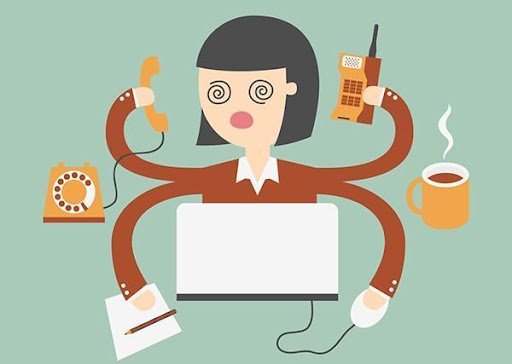Media Multitasking
By: James Orbach
Have you ever been on a date with someone while having a conversation and you keep looking at your phone every minute? Or while in class you keep messaging a friend as the lecture is going on? Lastly, do you even go to a concert and try to enjoy the moment while recording and taking photos simultaneously?
I’ve been in all of those! The cause is that we tend to think we can manage multitasking and I’m one of those people who think I’m capable of remembering information that was presented to me just a few minutes ago. A couple weeks ago I went to a concert where I tried to not use my phone such as looking at it while recording videos of the artist and not live through my phone camera as I tried to enjoy the moment with my own eyes and not behind the screen. But I kept on looking at the phone to make sure the video I was taking was of the artist. So why can’t we multitask?
When we feel like we are multitasking, such as studying for an exam and watching a movie we aren’t multitasking but rather toggling back and forth between two tasks… “People can’t multitask very well, and when people say they can, they’re deluding themselves…The brain is very good at deluding itself” (Dr. Julie Shaw 2016, p. 199). Because of how the brain tricks itself into believing it can manage to do multiple tasks it isn't as efficient, we would be better at doing single tasks since it’s more effective. Every time we switch from one task to another we may feel that we're getting things done quicker but in reality, we are just overloading our brains.
In The Memory Illusion it states that a 2014 review of academic research on the impact task-switching has on efficiency suggests that multitasking is bad for our productivity, critical thinking, and ability to concentrate (p. 199-200). When we try to multitask and think it will benefit us, it actually leads to increased stress and social life problems can arise which have a negative effect on work life.
Because of how we have the ability to look up any information within a second due to our phone we tend to spend a significant amount of time using technology. This creates an environment that makes us multitask at any given moment. In a survey they asked students about the amount of time they spend on texting, looking at social media, and web browsing. The results found that 51% reported texting, 33% reported using Facebook, and 21% used email while doing schoolwork somewhat or frequently. The use of media multitasking made students perform worse and it prevented them from long-term learning.
As I wrote this blog I did also fall victim to media multitasking—I would pause and look at my phone, and the TV that was playing which would make me stop doing work and get distracted for a couple of minutes. I would resume work after a 10 to 15 minute interval but as I continued working on the blog I would forget my thought process of what I was going to write about because of how my attention shifted to the media around me. So how can we still remain efficient while multitasking?
We should resist the temptation to divert attention, such as when you gonna check your phone, you should write it down on a piece of paper for later and continue on with your current task.
set yourself a certain time for each task, if while you're working on a task and suddenly you're tempted to do something else, set a time for that task or activity so you can look forward to it.
Lastly, set reasonable expectations. Before you want to start working on another task, take a break and reflect on what you’re doing before you start thinking about working on another task, finish your first task beforehand.
References
Shaw , J. (2016). The memory illusion. Penguin Random House UK.
Shonda , M.,& Dinan S. (2022). The myth of multitasking. Psychology Today.
https://www.psychologytoday.com/us/blog/the-therapeutic-perspective/202202/the-myth-multitasking
Mirza , A. (2021). 5 reasons you should say no to multitasking. [Image].https://www.hongkiat.com/blog/no-to-multitasking/
